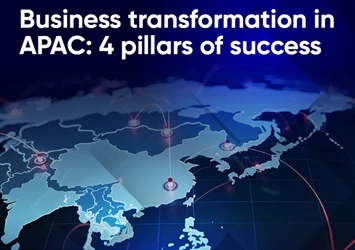'I am not afraid of an army of lions led by a sheep. I am afraid of an army of sheep led by a lion.'
Alexander the Great
We all like the idea of intelligent teams – but we also know, if we have had enough experience, that intelligent teams can often devolve into unhealthy competition between team members, and harbour a ghetto protectionist mentality towards the use of bots to enhance human work.
The Man-Machine approach sees teams working in an integrated way with machines, using them for what they do best and human skills when they are of greatest advantage. Teams network their emotional intelligence, human skills, creativities and idiosyncrasies and augment themselves with machines and AI to make the best use of their time on planet earth.
Which option sounds better to you? The choice is in our hands and this relies crucially on leading brainy teams, which is where we begin.
My early experience was in leading and managing Research and Development teams in new pharmaceutical product development. Together we innovated in bringing human insulin safely to diabetes patients and the world’s first effective HIV / AIDS treatment. The project involved working with a bunch of pharmacists, chemists and regulatory people to deliver the AZT / Zidovudine / Retrovir drug safely to the patient in record time against a background of a highly regulated pharmaceutical environment. This was essentially a challenge of leading teams of brainy people to do things quickly, when the normal modus operandi would have been to work deliberately but perhaps more slowly.
Paradoxically, intelligent teams need someone to help them keep focused on goals, harness human capabilities, and make relationships work between opposites. Good leadership and management are needed even more for brainy teams than ones where simple obedience and adherence to procedure is the order of the day.
Management is all about optimising a system, in other words, efficiency, whereas leadership is about changing the system, in other words, effectiveness. Some people’s jobs comprise more management than leadership and most people’s jobs require some elements of self-leadership, especially in an age where work may happen across enterprises, much of it with people who don’t share the same physical space or deep relationships. So management and leadership will need to change in the Man-Machine age from ideas of control and command towards those of community and commitment.
Leadership is both what I call a digital and analogue activity. It is digital, because wise leaders use facts and data rather than just intuition to inform decisions. It is analogue because human beings are hugely individual in their motivations and also occasionally illogical in their behaviour. This requires leaders to adjust, flex and finesse their strategies to the people they lead, sometimes on a completely personalised basis.
Views of leadership have changed over the ages, and it could be said that leadership thinking has mirrored the age in which the ideas were put forward. Henry Ford was a great advocate of Frederick Taylor, and believed that his factories could be organised along the lines of scientific management and detailed work study - clearly a grand design for the industrial age when leaders could operate through command and control and to some extent the employees could be treated as units of production (sound familiar? Think of the current obsession with gig economy working, Uber jobs, zero hour contracts and the like).
More recently the issue of authenticity has begun to take hold as a major idea in modern leadership thinking. In the last 20 or so years, the task of leadership has also shifted focus towards the management of complexity, uncertainty and the unknowable in which leaders can derive power and authority from a number of places:
- Your formal position (CEO, Head of Informatics, enterprise given title etc.). Position power gives you the platform to give out orders but does not necessarily provide you with influence.
- The resources you can command or marshal towards a goal (time, money, people). Resource power enables you to throw money and people at problems, but does not necessary command respect of itself.
- Your professional expertise. For example if you are a pharmacist, engineer, social worker and so on, this may buy you respect in your professional field.
- Your social capital through networks. It is not so much what you know but who you know and access to these people that counts here. This is your ability to get things done through others. In my case I was able to broker an introduction for Gina Miller to Sir Richard Branson. This was to help her win her case at the Supreme Court and challenge the legal basis of our Government’s attempt to turn back 400 years of sovereignty. This is a tangible example of the importance of networks.
- The information you hold (not data, but truly their ability to use information to advantage). Clearly in an information-based economy, this is a key element of your personal platform as a leader, which is why the mastery of knowledge management for precision decision is a key issue for Brain Based Leaders.
- Your personal power. Another way to think about this is the word charisma
Each of these elements of power can be used in a positive way (give) or in terms of withholding (take) in more Machiavellian styles of leadership, such as negotiation, co-option or coercion. Whereas it was once true that leaders could rely on those things that an enterprise could give them to maintain authority, that basis of leadership is being challenged around the world. Portfolio working and gig economy jobs often leave us without any enterprise given sources of power.
In any case leaders are not longer respected for position or resource power alone, as people challenge the norms of authority. We see this in everyday life where there is reduced deference to powerful people, celebrities and / or people with titles, such as monarchs, presidents and politicians. Leaders in a Brain Based Economy must command respect through authority earned rather than given. So, power gained from your professional expertise, networks, information and charisma are the main building blocks of your platform of authority as a leader, with information mastery as the rising star in the Brain Based Economy. This is a very different way of leading.
Although there is probably little proof in evidential terms that charisma, personal power or spiritual intelligence is a ‘thing’, most of us know when we have been in a room with someone who possesses it. Having met Sir Richard Branson, Roberta Flack, Nadine Hack, Bob Geldof, Gina Miller, Professor Charles Handy and other luminaries, it is quite clear that these people have whatever ‘it’ is, even if you don’t like or agree with anything they say.
Charisma, personal power or spiritual intelligence is the quality that causes people to walk over hot coals to deliver for you. Of course this has a positive and potentially negative quality in terms of getting people to do their best and brainwashing them to consider doing their worst. We need the former.
Abridged from Brain Based Enterprises: Harmonising the Head, Heart and Soul of Business by Peter Cook.
































